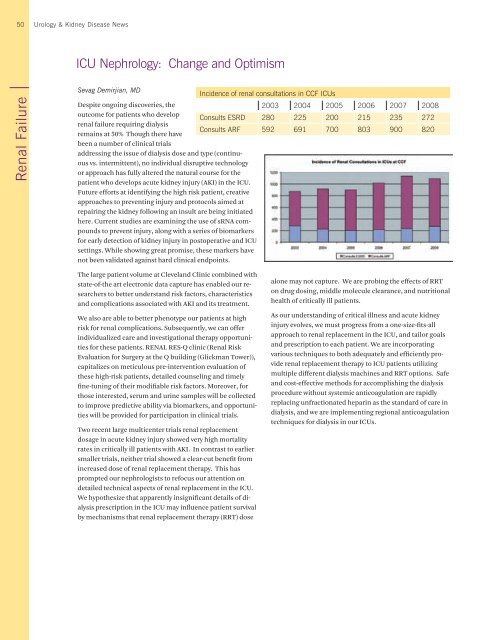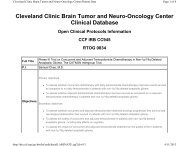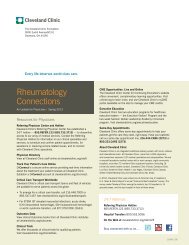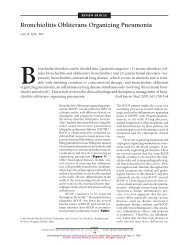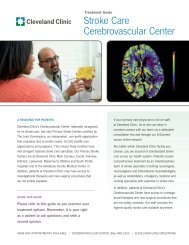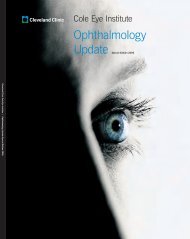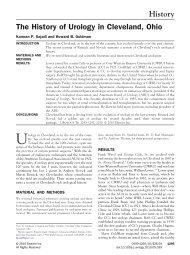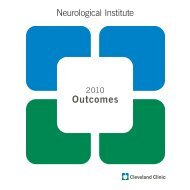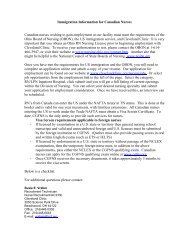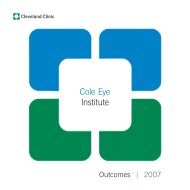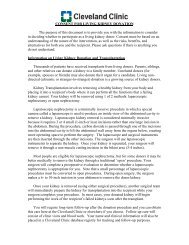Urology & Kidney Disease News Fall 2009 - Cleveland Clinic
Urology & Kidney Disease News Fall 2009 - Cleveland Clinic
Urology & Kidney Disease News Fall 2009 - Cleveland Clinic
You also want an ePaper? Increase the reach of your titles
YUMPU automatically turns print PDFs into web optimized ePapers that Google loves.
50 <strong>Urology</strong> & <strong>Kidney</strong> <strong>Disease</strong> <strong>News</strong><br />
Renal Failure<br />
ICU Nephrology: Change and Optimism<br />
Sevag Demirjian, MD<br />
Incidence of renal consultations in CCF ICUs<br />
Despite ongoing discoveries, the<br />
2003 2004 2005 2006 2007 2008<br />
outcome for patients who develop<br />
Consults ESRD 280 225 200 215 235 272<br />
renal failure requiring dialysis<br />
Consults ARF 592 691 700 803 900 820<br />
remains at 50% Though there have<br />
been a number of clinical trials<br />
addressing the issue of dialysis dose and type (continuous<br />
vs. intermittent), no individual disruptive technology<br />
or approach has fully altered the natural course for the<br />
patient who develops acute kidney injury (AKI) in the ICU.<br />
Future efforts at identifying the high risk patient, creative<br />
approaches to preventing injury and protocols aimed at<br />
repairing the kidney following an insult are being initiated<br />
here. Current studies are examining the use of sRNA compounds<br />
to prevent injury, along with a series of biomarkers<br />
for early detection of kidney injury in postoperative and ICU<br />
settings. While showing great promise, these markers have<br />
not been validated against hard clinical endpoints.<br />
The large patient volume at <strong>Cleveland</strong> <strong>Clinic</strong> combined with<br />
state-of-the art electronic data capture has enabled our researchers<br />
to better understand risk factors, characteristics<br />
and complications associated with AKI and its treatment.<br />
We also are able to better phenotype our patients at high<br />
risk for renal complications. Subsequently, we can offer<br />
individualized care and investigational therapy opportunities<br />
for these patients. RENAL RES-Q clinic (Renal Risk<br />
Evaluation for Surgery at the Q building (Glickman Tower)),<br />
capitalizes on meticulous pre-intervention evaluation of<br />
these high-risk patients, detailed counseling and timely<br />
fine-tuning of their modifiable risk factors. Moreover, for<br />
those interested, serum and urine samples will be collected<br />
to improve predictive ability via biomarkers, and opportunities<br />
will be provided for participation in clinical trials.<br />
Two recent large multicenter trials renal replacement<br />
dosage in acute kidney injury showed very high mortality<br />
rates in critically ill patients with AKI. In contrast to earlier<br />
smaller trials, neither trial showed a clear-cut benefit from<br />
increased dose of renal replacement therapy. This has<br />
prompted our nephrologists to refocus our attention on<br />
detailed technical aspects of renal replacement in the ICU.<br />
We hypothesize that apparently insignificant details of dialysis<br />
prescription in the ICU may influence patient survival<br />
by mechanisms that renal replacement therapy (RRT) dose<br />
alone may not capture. We are probing the effects of RRT<br />
on drug dosing, middle molecule clearance, and nutritional<br />
health of critically ill patients.<br />
As our understanding of critical illness and acute kidney<br />
injury evolves, we must progress from a one-size-fits-all<br />
approach to renal replacement in the ICU, and tailor goals<br />
and prescription to each patient. We are incorporating<br />
various techniques to both adequately and efficiently provide<br />
renal replacement therapy to ICU patients utilizing<br />
multiple different dialysis machines and RRT options. Safe<br />
and cost-effective methods for accomplishing the dialysis<br />
procedure without systemic anticoagulation are rapidly<br />
replacing unfractionated heparin as the standard of care in<br />
dialysis, and we are implementing regional anticoagulation<br />
techniques for dialysis in our ICUs.


